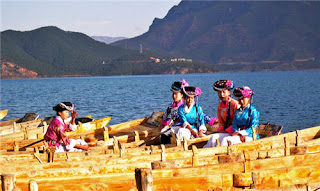The Mosuo people, an ethnic minority group who live on the shores of Lake Lugu in China, follow a matriarchal, matrilineal culture. Their main deities are the Goddess of the Lake and the Goddess of the Mountain -- specifically, the highest mountain adjacent to the lake, the Mother Mountain, the Lion Moutain, Gemu.
"The lion is called "Gem" in Mosuo language, "Senggem" in Tibetan, "Sengge" means lion, and "Gemu" means white goddess." The sleeping lion faces the lake with its head facing the lake. The slanted Hengling is the lion's claws, resting in the lake water (source).
Among the Mosuo, women head most households and control most property. "Marriage as other cultures know it is uncommon among the Mosuo; they prefer a visiting relationship between lovers--an arrangment they sometimes refer to in their language as sisi (walking back and forth). At about the age of twelve, a Mosuo girl is given a coming-of-age ceremony, and after puberty, she is free to receive male visitors. A lover may stay overnight in her room, but will return in the morning to his own mother's home and his primary responsibilities. Children born from such a relationship live with their mother, and the male relatives responsible for helping to look after them are her brothers."
"Lovers can end their relationship at any time; a woman may signal her change of heart by simply no longer opening the door." In Chinese, the Mosuo call the arrangement a walking marriage or friend marriage (source - Natural History Magazine 11/2000).
The most important annual celebration of Gemu, the Mother Mountain, occurs on the 25th day of the seventh month of the lunar calendar. "On that day, everywhere on the mountain you can find the Moso, finely dressed for the festival, carrying food to celebrate with a banquet. Some walk, others ride horses. After making a circle of the mountain, each one goes to their suokuaku place, where they burn incense and carry out reverences to the mountain. They will hang a portrait of the Goddess of the Mountain, and they will pray to the goddess Gemu, asking her to liberate them from all misfortune, to let their grain grow, and to allow the people and livestock to prosper. They also worship the Goddess, offering her fruits, clean water, wine, and meat."
"When the religious rites finish, a great banquet begins, during which men and women, old and young, dance together in the Jiachati dance, enjoy horse racing, or take advantage of the festive atmosphere to find new love partners, with whom in the future they may establish an Azhu [friend marriage] relationship."
"The festival goes on for several days. During those days people leave the village in groups for the mountains, dressed in their festival finery, accompanied by their Lamas and Daba priests. Every time they arrive at a suokuaku spot, they revere their goddesses, burning incense and pine leaves, spreading water and milk, and offering meat and wine to them. Then they hang on the branch of a tree some image of their totem and some prayer flags and papers. The Daba priest will recite poems and songs to the Goddess of the Mountain, and the Lama will also read some prayers to the mountain, playing the drum with one hand and ringing a bell with the other, while some younger men blow the conch."
"All these sounds mix in the festive air. Men and women should perform koutous to the four directions and the eight directions. When they have performed this ceremony in each of the soukuaku places, they return home" (source).






Comments
Post a Comment